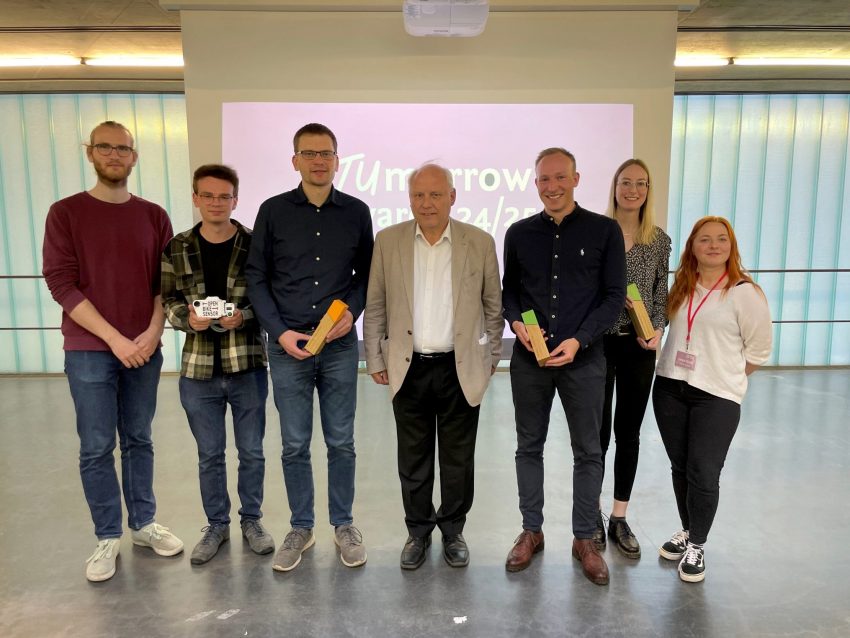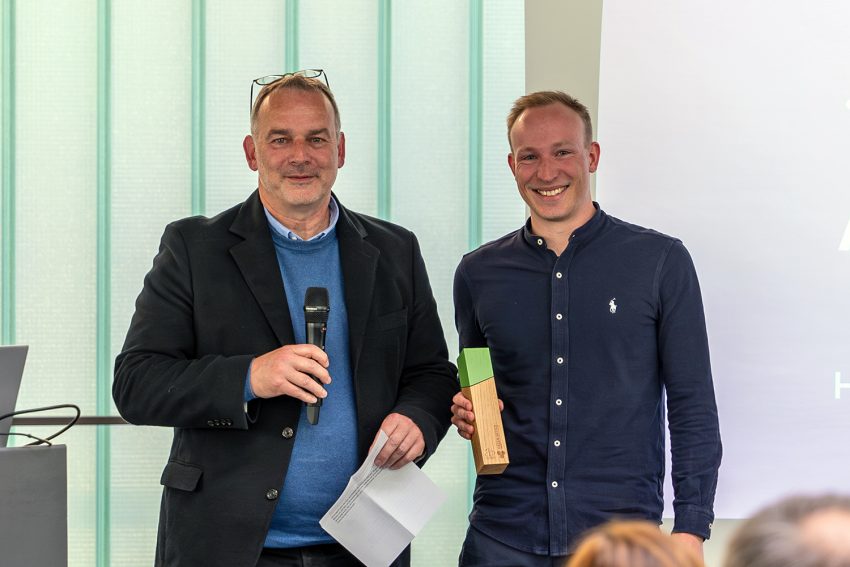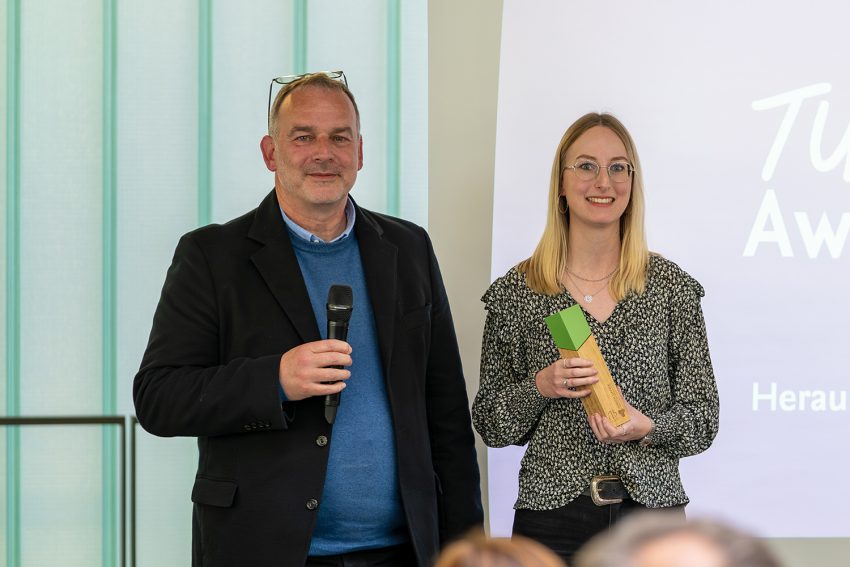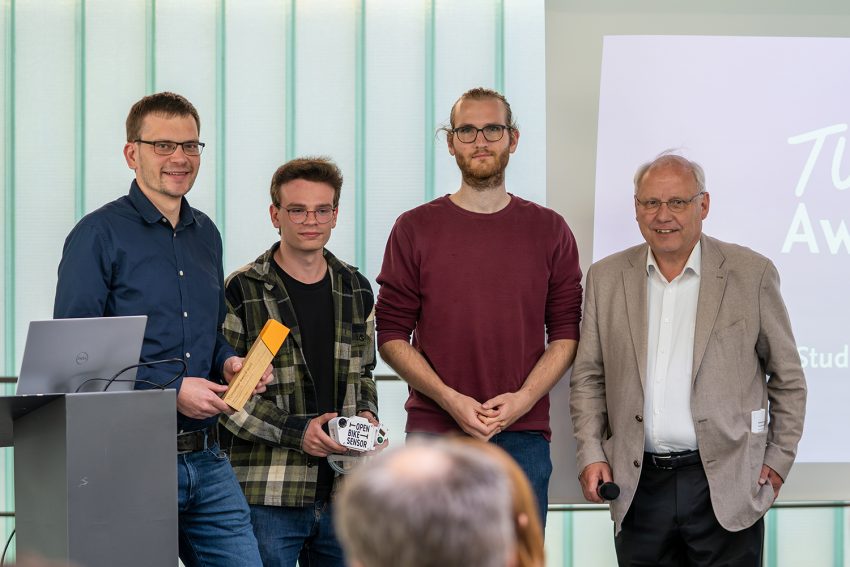Sustainability Awards presented TUmorrow Awards for commitment, study and teaching
To kick off TUmorrow Days 2024, the “TUmorrow Awards 2024 – Sustainability Awards of the Braunschweigischer Hochschulbund” were presented for the third time on 11 June. In the categories “Studentisches Engagement“ (Student Commitment), “Herausragende Bachelorarbeit“ (Outstanding Bachelor’s Thesis), “Herausragende Masterarbeit“ (Outstanding Master’s Thesis) and “Herausragende Lehrveranstaltung“ (Outstanding Course), the award winners were honoured for their special commitment to the topic of sustainability. The Green Office, the sustainability office of Technische Universität Braunschweig, presents the awards in cooperation with the Braunschweigischer Hochschulbund e.V. The awards are endowed with 500 euros each.

The winners of the TUmorrow Awards with the Chairman of the Braunschweigischer Hochschulbund Prof. Joachim Block. Photo credit: Mia Gutschalk/TU Braunschweig
The TUmorrow Awards are intended to encourage scientific and voluntary commitment to sustainability, to create greater visibility and to express appreciation. The aim is also to accelerate the achievement of the various sustainability goals in all performance dimensions in line with the agreed strategic direction of TU Braunschweig. The decision on the winners of the TUmorrow Awards was made by the Green Office in cooperation with a jury consisting of members from all TU status groups.
The winners of the TUmorrow Awards of the Hochschulbund
Award for Student Commitment
The award for Student Commitment went to Dennis Ruth, Kai Purwig, Fabian Schwartau, Lukas Zilian, Clemens Nowitzki, Markus Windelen and Nils Grehm for the “Open Bike Sensor” project. The Open Bike Sensor measures the overtaking distance between motor vehicles and cyclists. The organisers were able to motivate many people to take part and install a sensor on their bike. The measured data is visualised in heat maps and provides objective and transparent evidence of where and how often people overtake too closely. By collaborating with regional traffic initiatives and embedding the project in research and teaching at TU Braunschweig, the data collected will help to provide the administration and politicians with additional information to help them take action.
Bachelor’s thesis

Prof. Manfred Krafczyk presents the award to Kay-Laurens Niemeijer for his Bachelor’s thesis. Photo credit: Ahmed Nassef/TU Braunschweig
The Outstanding Bachelor’s Thesis Award went to Kay-Laurens Niemeijer, an Industrial and Mechanical Engineering student, for his Bachelor’s thesis entitled “Bewertung von klimabedingten Transitionsrisiken“ (Assessment of climate-related transition risks). His thesis provides a comprehensive overview of transition risks, i.e. the financial risks that companies and investors may face in the transition to a lower-carbon economy and society. He also shows how these can be quantified in scientific models, critically assesses the methodologies and results, and describes the long-term climate change implications.
Master’s thesis

Prof. Manfred Krafczyk honoured Luisa Strzelczyk for the “most sustainable” Master’s thesis. Photo credit: Ahmed Nassef/TU Braunschweig
Luisa Strzelczyk received the award for the “most sustainable” Master’s thesis. The topic of her award-winning thesis in the Environmental Engineering degree programme was “Erweiterung einer Kläranlage unter Berücksichtigung energetischer und ressourcenökonomischer Aspekte“ (Expansion of a wastewater treatment plant under consideration of energy and resource efficiency aspects). In her thesis, she examined the integration of additional wastewater from the neighbouring municipality into the Bienenbüttel wastewater treatment plant as part of an inter-municipal cooperation. She measured the load and capacity of the plant and checked that it was working properly. She also measured energy consumption to identify potential savings and to develop an overall ecological concept for energy optimisation and expansion of the plant. Her work is characterised by a holistic view of the treatment plant and the transferability of the concept, as well as the ease of practical implementation at other treatment plants.
Course
Dr. Thorsten Schoormann and Prof. Dr. Frederik Möller from the Department of Data-Driven Enterprise at the Institute of Business Information Systems received the award for the most outstanding course. Their course “Digitale Geschäftsmodelle und Nachhaltigkeit“ (DiGeNa) (Digital Business Models and Sustainability) used a variety of teaching methods to provide students with the skills to systematically visualise, analyse and innovate business models, with a particular focus on environmental and social sustainability goals. Students were able to put these skills into practice immediately and try out new business solutions to problems of their own choosing.

